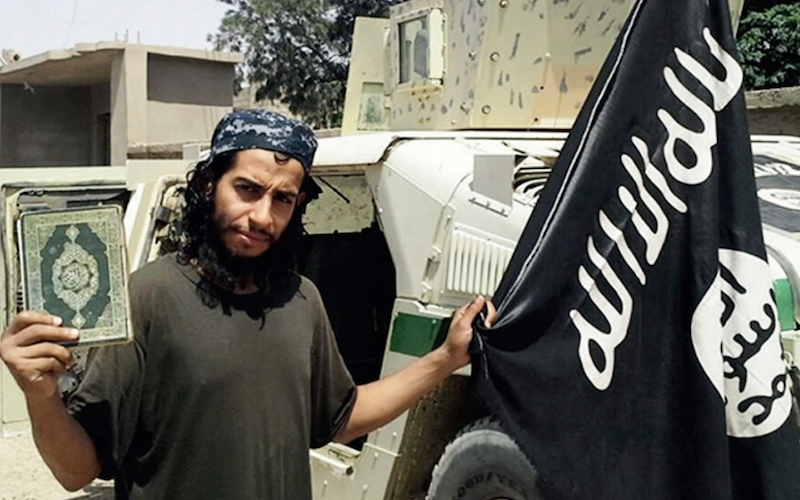
Defeating Terrorism Will Require a Robust, Integrated Strategy
Terrorism is a complex phenomenon that has been around for centuries. Terrorist organizations such as Al Qaeda, Hamas, and Boko Haram challenge the stability of nations and regions worldwide. Terrorism is used by these groups as a tactical tool to leverage violence in order to gain specific concessions related to the group’s goals. Terrorist acts are rational and calculated choices that are designed to subject a government or actor to alter its decisions and policies. Al Qaeda and Hamas, to cite a couple of examples, use terrorist tactics as a strategy of the weak seeking to gain advantage against stronger armies or political powers.
Countries such as the United States are employing counterterror and counterinsurgency operations aimed at thwarting several of these terrorist organizations. Counterterror measures include the use of armed drones and Special Forces that specifically target the ability of terrorists to carry out violent acts against the United States and its allies. Counterinsurgency efforts involve the establishment of partnerships with other countries’ militaries, strengthening the rule of law, and building stable nations through investments in infrastructure and government institutions.
After the recent attacks in Paris, San Bernardino, Brussels, and Ankara, it has become evident that both counterterror and counterinsurgency measures are ever more required to reduce terrorist’s capacity to organize, strategize, and execute violent acts. Nonetheless, in order to defeat terrorism, it is critical that military, law enforcement, policy makers, and other civilian actors consider the factors that help engender terrorism in the first place. When we contemplate the multiple reasons why terrorist organizations have emerged, it becomes glaringly apparent that our strategic approach to combatting non-state violent actors must encompass the integration of multiple perspectives that reconcile the various factors which have been linked with terrorism.
Nationalistic Motives
The notion of employing terrorism as a means of challenging an existing order has become prominent. Algerian terrorists who fought against French rule, Basque separatists who used violence against the Spanish state, and Irish militants who conducted actions against Great Britain grounded their activities on nationalistic causes.
In some cases, terrorism turned into a strategic tool to express anti-colonial sentiments. The Irish Republican Army (IRA) emerged from the ideal of Irish Catholics to form an independent republic, rather than to continue to live under the control of Great Britain.
During the late 1960s and early 1970s, the Popular Front for the Liberation of Palestine (PFLP), a Palestinian Marxist-Leninist and revolutionary leftist organization, opposed the moderate stance of Fatah as well as negotiations with the Israeli government.
The Kurdistan Worker’s Party which formed in the 1970s, used terrorist tactics to pursue its intent of establishing an independent Kurdish state. The Kurdistan Worker’s Party sought national autonomy from Turkey, Syria, Iran and Iraq.
Political Interests
Terrorism is a tool designed to influence the policy of a government through intimidation or coercion. Hundreds of years ago, terrorism was first used in the context of insurgency and guerrilla warfare, a type of organized political violence carried out by non-state actors.
The violent acts carried out at the 1972 Munich Olympics by the Black September Organization (BSO), a Palestinian non-state actor, were politically motivated. Black September sought to negotiate the release of Palestinian prisoners. Black September’s official name for their operation was ‘Ikrit and Biram,’ after the names of two Palestinian villages whose residents had been killed or expelled by the Israeli military Haganah in 1948. Euskadi Ta Askatasuna (ETA), the Basque nationalist and separatist movement conducted kidnappings and carried out several bombings. ETA’s principal goal was to gain independence for the Greater Basque Country.
In the 1980s and 1990s, terrorism was adopted by right-wing, neo-Nazi and neo-fascist groups. Similar to terrorist actors that preceded them; these violent non-state actors pursued political interests aimed at subjugating the interests of other racial groups that had received greater political rights through constitutional reforms and civil rights reforms. Many of these neo-Nazi or neo-fascist groups grew fearful of a society that granted political and social recognition, political rights, and economic franchise to ethnic minorities. Fearful that some minorities would move to their neighborhoods and take their jobs, groups such as The Popular Association – Golden Dawn in Greece have used terrorism to intimidate and attempt to influence the political environment. In the case of Golden Dawn and other similar terrorist groups, a confluence of factors seems to drive their violent activities – anti-immigrant rhetoric, racism, xenophobia, nationalism, and political interests.
Economic Dislocation
Socio-economic circumstances certainly play a role in the conditions that give rise to terrorism. Being poor and enduring ongoing social calamities does not cause an individual to become a terrorist. However, a town or village in where there are no economic opportunities, no jobs, and where there is a lack of water, food, sanitation, and education, may more easily enable terrorist leaders to come in and recruit disenfranchised individuals. Terrorist organizations thrive in environments where there are virtually no choices and options to change one’s personal condition. Regrettably, many of the individuals who are recruited by terrorist organizations do not know how to read or write. Terrorist leaders often quote religious texts and selective historical recounts of past events to persuade these individuals to join their cause.

Poverty does not create terrorists. But, it helps make some individuals more susceptible to recruitment by terrorist organizations. Terrorist groups exploit despair and desperation and effectively use idealism to inspire recruits to join their movement with the promise of a better future. Income inequality does not cause terrorism, but it creates economic disparity that is often exploited cleverly by terrorist organizations. Economic dislocation, due to the reduction of foreign direct investment, loss of jobs, et al, helps to enable conditions where terrorism can develop. During and after the Gulf War, many who worked in the Persian Gulf lost their jobs due to the unstable economic climate. For many of these workers, the frustration grew as they had no income to support their families. Economic disparity along with religious conservatism converged and propelled fundamentalist movements in the 1990s.
Religious Fanaticism
Terrorists and radical extremists often choose to interpret and use religion to justify their violence. Religious fanaticism may help to create conditions that are favorable for terrorism to surface. Organizations such as Al Qaeda, Hamas, Hezbollah, and ISIS selectively interpret and exploit religious concepts and texts to support their terrorist activities. Religions themselves do not cause terrorism. Instead, terrorist groups exploit religious concepts, distort, and strategically fit texts into a rhetoric that meets their interests and justifies their use of violence.
Terrorist groups inspired by religious and nationalist goals have committed violent attacks, including the assassination of Egyptian President Anwar Sadat, and suicide bombings in Israel. Aum Shinrikyo in Japan and radical Islamic Jihadists have also employed carefully selected religious language to support their respective ideologies and subsequent actions.
The increased politicization of religion and the tendency to speak politically in a religious dialect have become more common both in the mainstream as well as in violent extremist circles. This has contributed towards a greater convergence between political ideology and religious doctrine which often is manipulated by terrorist groups that seek to advance their interests.
Groups such as Al Qaeda, Hamas, Hezbollah, and ISIS have used particular religious texts and confounded them with other group interests and motivations that fall under the political, economic and social realm. Several violent extremists and religious-based terrorist groups have learned to effectively manipulate religious concepts to recruit individuals and to have them carry out violent activities that satisfy the leaders’ own purposes.
Psychological Causes
Researchers have attributed psychological causes to terrorist behavior. Ferracuti and Bruno conducted a study, “Psychiatric Aspects of Terrorism in Italy,” in which they concluded that terrorists often have ambivalence toward authority, defective insight, emotional detachment from the consequences of their actions, and low education.
Social psychology views of terrorism suggest that groups, not individuals, are the best way to explain terrorism. This perspective also shares common ground with studies of authoritarianism and cult behavior that examine how individuals come to identify so strongly with a group that they lose their individual identity.
Jerrold Post explained that terrorists subordinate their individual identity to the collective identity, so that what serves the group, organization or network is of primary importance. Some scholars suggest that individual members of terrorist groups relinquish or subordinate their own identity to that of the group. Thus, to best understand how and why terrorist groups work, and how best to engage and ultimately counter them, more studies of their group psychology are required.
Ideology
Terrorist groups seem to appear as counter-movements or ‘anti-movements.’ Typically, the group’s collective identity is established early in the process. Usually the identity is one of ‘victims of repression.’ For extremist and terrorist groups there is an existing unacceptable status quo that must be repelled in favor of an ideal towards which the group must strive. As a result, the group often seeks to develop a new found identity rooted in socio-historical contexts, experiences, and cultural factors. The group may have members who have experience with violence. A past history of violent behavior is strongly associated with the potential use of future violence. A group’s collective experience with violence may lead it to engage in violent terrorist activities.
Over time, the group’s identity is transformed and no longer rooted in the specific interests and views of a certain group of individuals. Instead, the identity comes to represent an abstract figure or mythical concept. The emergence of terrorist groups appears to be directly associated with a process of identity creation. Terrorist organizations in turn modify an individual’s or group’s belief systems, values, and identity. Accordingly, they transcend the initial ideology and transform identity, ideology, and goals.
History and Culture of Violence
History delivers the context under which the resort to violence is undertaken. In fact, the historical background of a group or region may lead to the belief that new actors must break with the past and help pursue change. A formerly colonized society may possess ‘a set of memories’ which in turn help to fuel its desire to reshape its identity and pursue its own goals. Many people have experienced different forms of colonialism, invasion, and occupation which conversely have produced deep marks on those resulting cultures. Others have been marginalized and socially oppressed.
Various terrorist groups have risen around the world hoping to modify an existing order that has been in place and subordinated their interests. This also has led to the emergence of ideologies, beliefs, and views that sometimes incorporate resentful and violent actions that are carried out with a sense of urgency. Most terrorist groups have justified their violence with a deep belief in the necessity and justice of their cause, and a need to amend history.
Certain groups around the world accept violence as a legitimate means of expressing discontent or disapproval, resolving disputes, and competing with other groups for political and/or economic control. In some cases, violence is perceived as a means of establishing political order. Hence, for some groups the use of violence is a necessity for pursuing their interests and achieving the change desired. Some regions have experienced multiple coups, insurgencies, revolutions, and conflict which have led to a cultural tolerance of violence.
Finally…
Tyranical governments and dictatorships engender oppression, bad governance, and corruption, all of which in turn amplify discontent and anger. Where the rule of law is weak, and there is low enforcement of civil and political rights, combined with economic dislocation, a history of violence, religious fanaticism, and groups that wish to modify the status quo through any means necessary, there is the risk of terrorism.
Also, cultures where there is, or where there has been communal or tribal conflict between competing domestic groups, are at risk of witnessing terrorism. Sometimes, deep rooted conflict over class, ethnicity, and religion may result in violent societies that spawn terrorist organizations.
In order to defeat terrorism, it is critical that governments invest in education and economic development initiatives. Furthermore, stakeholders must explore and consider the various factors that converge and help induce terrorism. Multiple perspectives, namely those that take into account political interests, nationalism, economic dislocation, religious fanaticism, psychological factors, history, and ideology, must reconcile the complex relationships between these dynamic factors that spawn terrorism. Counterterror and counterinsurgency operations must continue as part of the grand strategy. Yet, there is a pressing necessity for integrating these aforementioned factors into a robust, holistic calculated strategy.
